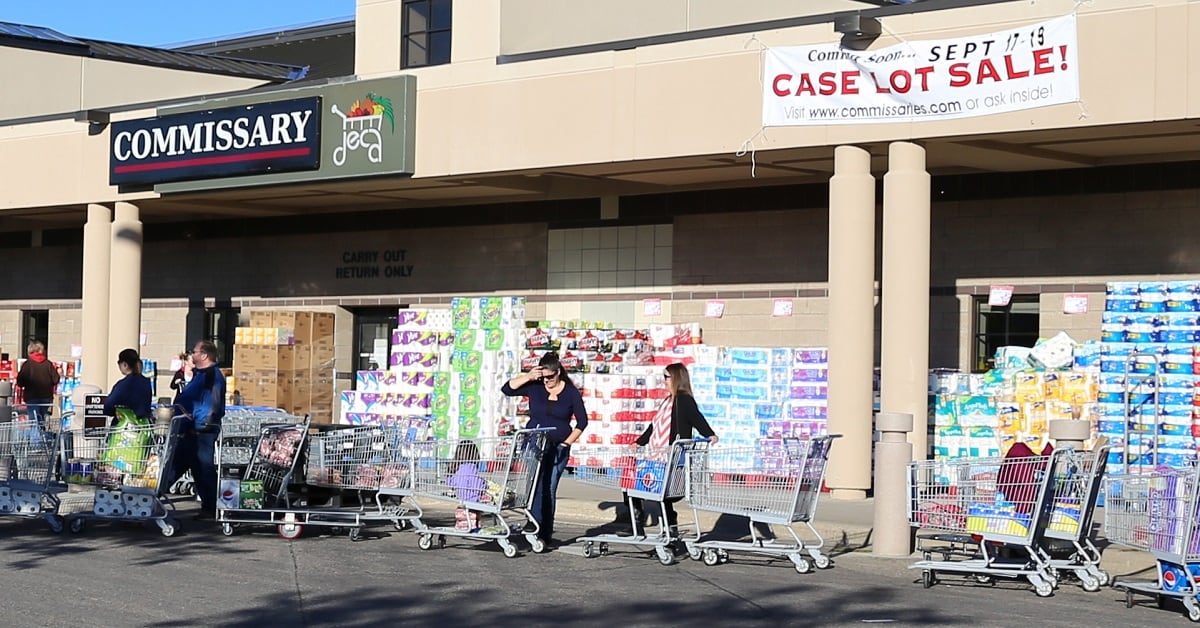More than a week into a new benefit for about 4 million more people, there are some increases in customers, but they’re also facing some problems.
Adding to the challenge is that the new benefit, which started Jan. 1 for certain veterans and veteran caregivers, was launched at a time when military installations have implemented heightened security measures at their gates because of ongoing tensions between the U.S. and Iran. That’s meant more time-consuming security checks leading to delays and long lines of traffic at many bases. These newly eligible veterans and veteran caregivers must go to the visitor center for an on-the-spot background check the first time they come onto an installation, and they are in the mix of those trying to get into the installation.
Commissary officials said they’re seeing a “definite increase” in new customers shopping at several locations. As of today, the top 10 in these transactions are Pearl Harbor, Hawaii; McClellan, Calif.; March Air Reserve Base, Calif.; MacDill Air Force Base, Fla.; Patrick AFB, Fla.; Pensacola Naval Air Station, Fla.; Fort Buchanan, Puerto Rico; Fort Sam Houston, Texas; Orote, Guam and Travis AFB, Calif. Numbers of customers or amount of sales weren’t available from commissary officials.
Marine Corps bases are seeing light participation at exchanges and other resale programs, said Bryan Driver, spokesman for business and support services division, which operates exchanges and MWR activities.
The information provided by store officials was mostly anecdotal at this early stage. For example, more than 40 newly eligible veterans shopped at the Naval Base Guam store on Jan. 1, and the exchange at Naval Air Station Key West has seen about 25 customers with these expanded privileges, said Navy Exchange Service Command spokeswoman Kristine Sturkie.
The new benefits were authorized by law for all veterans with VA service-connected disability ratings; Purple Heart recipients; veterans who are former prisoners of war; and primary family caregivers of eligible veterans under the VA caregiver program. Previously those with a 100 percent service-connected disability rating, and Medal of Honor recipients were allowed the benefits.
According to the Purple Heart and Disabled Veterans Equal Access Act of 2018, a section in the fiscal 2019 National Defense Authorization Act, these populations are now entitled to access to commissaries, exchanges and certain morale, welfare and recreation facilities on the same basis as military retirees.
User fees double charged
Treasury Department officials are working to correct a system error that has resulted in double charging new customers the user fee when they used a PIN debit card. Commissary officials estimate the average overcharge is about 38 cents per transaction, said Gary Frankovich, spokesman for the Defense Commissary Agency. Officials were notified of the problem Jan. 9, he said, and a temporary solution is being put into place to stop the double charges until a permanent fix is in place.
The glitch didn’t affect those using credit cards.
Anyone who was double-charged the user fee will automatically receive a refund from the Treasury Department for that amount. Officials ask that customers give officials a few days to refund the money to their cardholder accounts, Frankovich said. “Neither cardholders nor their financial institutions need to do anything to initiate a refund.”
New commissary customers with this benefit are charged a user fee to offset any increased expenses by the Treasury Department. These customers are charged 0.5 percent of transactions for PIN debit cards and 1.9 percent for credit cards. Commercial card companies charge transaction fees to retailers when customers use their cards. By law, the expansion of customers can’t include extra costs associated with using debit or credit cards in commissaries; the cost must be passed on to the customer. The user fee is only charged at commissaries, not at exchanges or other retail MWR activities, and it doesn’t apply to other previously authorized commissary customers.
RELATED

Are spouses allowed on base or not?
At a number of installations, veterans are being told their spouses or other family members can’t come onto the installation with them. Yet defense officials have told Military Times previously that these newly authorized veterans and caregivers will be allowed to bring their spouses and family members into the stores with them as guests. These guests don’t have the new benefits, so they aren’t allowed to purchase anything. The information is also on the DoD Military OneSource website.
At MacDill, officials have published a policy that’s counter to that DoD position.
“The new legislation does not grant escort or sponsorship privileges,” according to a press release issued by the base. It states that eligible veterans and caregivers who are granted access to the installation and to base amenities “will not be able to bring family or members or guests with them them” unless those people have base privileges through their own veteran or military-affiliated status. Even with the limiting policy, MacDill is still among the top commissaries in terms of traffic of these new customers.
Clarification from defense officials was not immediately available. Commissary, exchange and MWR officials have no control over security procedures at installation gates.
Marine Corps veteran Allen Compton said he called Naval Air Station Jacksonville, Fla. — the exchange, the commissary, and the front gate — to make sure he could gain access to the base with his spouse to shop, before he drove 2 ½ hours from Tallahassee on Saturday, Jan. 4. When he arrived, the guard at the gate told him his wife wouldn’t be allowed into the base to shop.
“I found this odd, as she had been on the base numerous times with her retired father, never denied entry and never checked in, just sat in the passenger seat,” said Compton, in an email to Military Times. She also went into the commissary and exchange with her father.
When Compton and his wife went to check in at the security building, they were told they had to have an appointment, although there were only two other people waiting in the office. The next available appointment was the following Tuesday. They don’t intend to ever return, he said.
Other issues reported:
- Some veterans reported being told they weren’t allowed to buy alcohol and tobacco, but all merchandise is available for purchase, as it is for military retirees.
- Some veterans have reported that they’ve been turned away from some Coast Guard bases, but the new benefit applies to Coast Guard installations as well as Army, Navy, Air Force and Marine Corps installations.
- For those customers living overseas, the benefit varies from location to location, depending on the Status of Forces Agreement with the host nation.
Karen has covered military families, quality of life and consumer issues for Military Times for more than 30 years, and is co-author of a chapter on media coverage of military families in the book "A Battle Plan for Supporting Military Families." She previously worked for newspapers in Guam, Norfolk, Jacksonville, Fla., and Athens, Ga.





